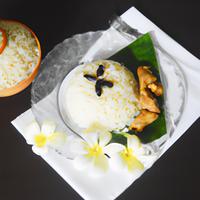
1 serving (140 grams) contains 205 calories, 4.3 grams of protein, 0.4 grams of fat, and 45.0 grams of carbohydrates.

Log this food in SnapCalorie

Nutrition Information
Calories |
347.5 | ||
|---|---|---|---|
% Daily Value* |
|||
| Total Fat | 0.7 g | 0% | |
| Saturated Fat | 0.2 g | 1% | |
| Polyunsaturated Fat | 0 g | ||
| Cholesterol | 0 mg | 0% | |
| Sodium | 1.7 mg | 0% | |
| Total Carbohydrates | 76.3 g | 27% | |
| Dietary Fiber | 1.0 g | 3% | |
| Sugars | 0 g | ||
| protein | 7.3 g | 14% | |
| Vitamin D | 0 mcg | 0% | |
| Calcium | 32.2 mg | 2% | |
| Iron | 2.5 mg | 13% | |
| Potassium | 93.2 mg | 1% | |
* Percent Daily Values are based on a 2,000 calorie diet. Your daily values may be higher or lower depending on your calorie needs.
Food Attributes
Source of Calories
About Jasmine rce cooked
Jasmine rice, a long-grain variety originally from Thailand, is prized for its soft, fluffy texture and mildly floral aroma. Renowned in Southeast Asian cuisine, its delicate flavor complements dishes ranging from savory stir-fries to creamy curries. Jasmine rice is primarily made up of carbohydrates, offering a quick source of energy. While it contains trace amounts of protein and iron, it is low in fat and cholesterol-free. It's available in both white and brown varieties, with the latter providing more fiber and nutrients due to minimal processing. White jasmine rice, while easy to digest and widely loved for its smooth texture, has a higher glycemic index, which may impact blood sugar levels if consumed in large quantities. For a more balanced meal, it’s often paired with nutrient-rich vegetables and lean proteins. Simple yet versatile, jasmine rice is a staple in wholesome, flavorful cooking around the globe.



